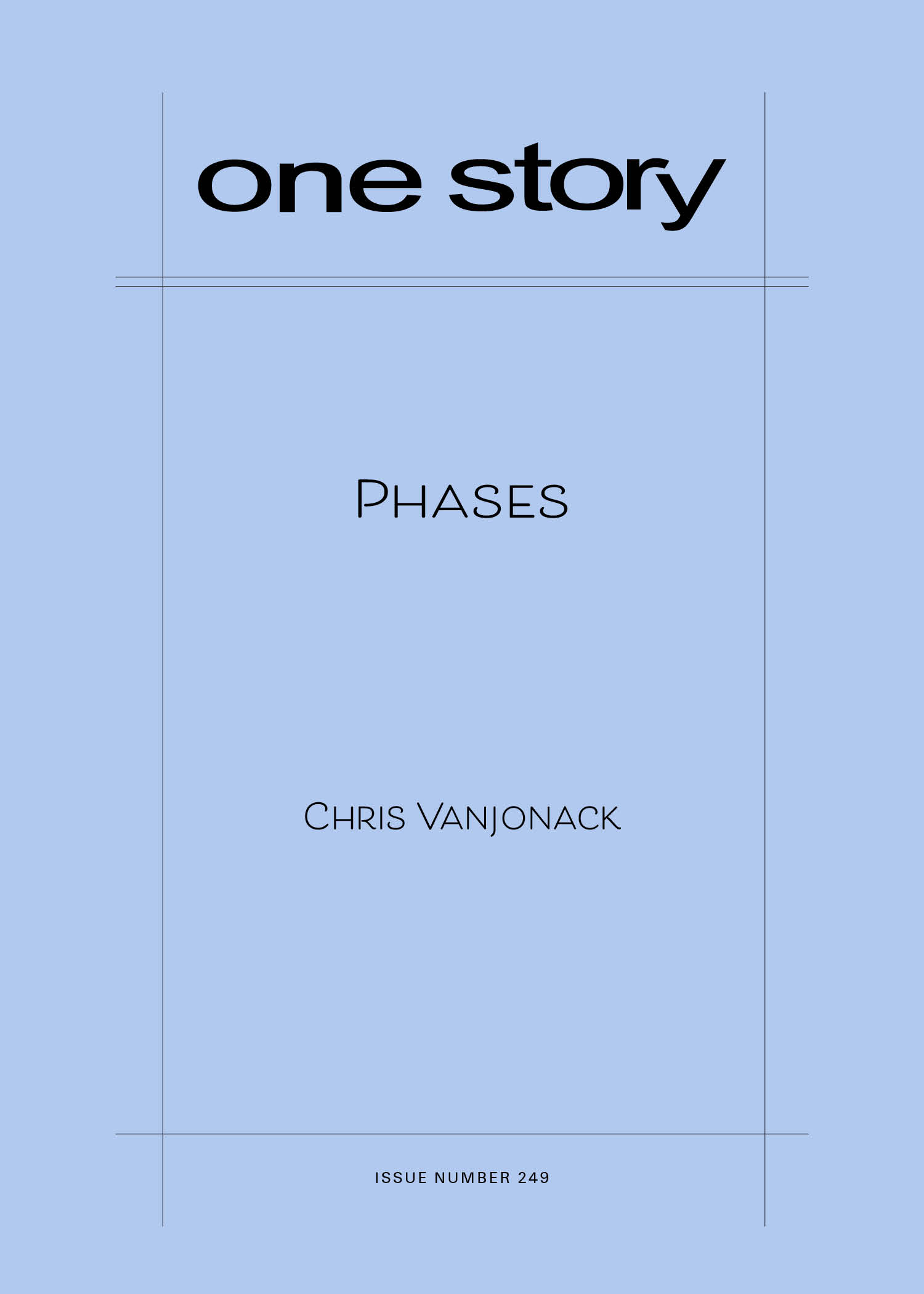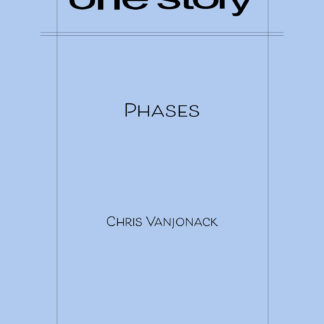
Phases
$2.50
52 in stock
Excerpt
Sol’s major red flag is that she does not believe in the authenticity of the 1969 Apollo 11 moon landing.
She does believe in subsequent moon landings, and in science, climate change, and vaccinations, but when she’s drunk, which is often, she likes to claim that Stanley Kubrick staged Neil Armstrong’s moonwalk on a soundstage in Huntsville, Alabama. We used to get into fights about it. Long, head-banging back-and-forths that started out funny but grew to reveal deep philosophical divides between us.
“I don’t understand how you could think this way,” I’d tell her, exhausted, sad.
A few weeks before my death in an electrical storm, she took it even further: “How can you be so sure that nothing happens when we die? That there are no such things as soulmates? That our spirits aren’t recycled? How can you be so positive that a little man, just like you, stepped foot on an astronomical body?”
In retrospect, I mean, fuck.
Chris Vanjonack
Chris Vanjonack is a language arts teacher living in Fort Collins, Colorado, where he enjoys co-hosting a monthly poetry slam and feeding his cat. His fiction has appeared in The Rumpus, The Boiler, Ghost Town, New Haven Review, and elsewhere. Check out more stories at chrisvanjonack.com.
Patrick Ryan on “Phases”
Is it bad form for a ghost to look over your shoulder while you’re typing an email? Do ghosts need therapy? How do ghosts have sex? These are the kinds of questions that rolled around in Chris Vanjonack’s head before he started writing “Phases.” Henry, the story’s narrator, had an unfortunate encounter with a lightning bolt sometime back. Now, his “life” consists of wandering the planet, walking through walls, and watching his ex-girlfriend get over him. And dating—sort of.
Henry is lonely but surrounded by other ghosts. He’s impatient but not even sure what he’s waiting for. And for all his mobility and freedom, he’s overwhelmed by limitations. As the author states in our Q&A, ghostdom, as he imagined it, became “a potent metaphor for depression, or for ennui, or loneliness, or even aging. No one can see me. I can’t make a difference. I don’t feel the way I used to. I can’t feel anything.”
But don’t be misled. “Phases” is no downer. In fact, it’s charged with wit and humor, and it’s fueled by a voice packed with charm. There’s a forward lean to the earnestness in Chris Vanjonack’s writing, and it shines through in this story. We’re delighted to welcome him into the One Story family.
Q&A by Patrick Ryan
- PR: Where did the idea for this story come from?
- CV: My old roommate and I used to kill time by pitching hacky, high-concept sitcom premises to each other, and if a January 2016 entry from one of my old notebooks is to be believed, “Phases” started out as one such premise (and as a dumb pun, no less). A ghost is tired of living in the past and decides to be more present. That was the idea. And I must have been extra obsessed with the paranormal that week, because dated a few days later is a note that just says, How do ghosts have sex? Which, as we all know, is one of those urgent questions that serious literature has been interrogating since at least the Romantic Period. It was too ridiculous a question to ignore, and I cranked out a rough draft of what would become “Phases” during a road-trip to El Paso, half in the backseat of a friend’s car and half at her mom’s place across several hours of a Say Yes to the Dress marathon.
- PR: Ghosts, I find, are often poorly utilized in fiction and film. For one thing, they talk to the living too much. For another, they’re often didactic and unbelievably wise—as if dying makes everyone smart, pushy, and verbose. You avoid these pitfalls by not having your ghosts be able to talk to the living at all. Were you ever tempted to break through that wall?
- CV: From day one of drafting, I was super committed to the idea that there was no way in hell the ghosts would ever be able to communicate with the living. Once you break that wall and let your ghosts talk to a medium, or interact with physical objects, or, you know, feel things, then suddenly it doesn’t suck to be a ghost anymore. Then they’re just dead dudes with superpowers. When you keep all those limitations in place though, you’re left with what I hope is a potent metaphor for depression, or for ennui, or loneliness, or even aging. No one can see me. I can’t make a difference. I don’t feel the way I used to. I can’t feel anything. These are ideas that you only get the full mileage out of if there aren’t any cheat codes. All that said: the Ouija board sequence is one of the most difficult scenes I’ve ever written, and at various points at 2:00 or 3:00 in the morning, the temptation was definitely there to just have Henry break through the rules of the story and say: “What’s up, I’m a ghost,” and have Sol hear it and be like, “Whoa!”
- PR: What was the most challenging aspect of writing this story?
- CV: Scaling back is always the toughest part for me. I’d never call “Phases” a grounded piece of fiction, but the first draft of this thing was completely bonkers: the ghosts zipped around outer space, sulked around the center of the Earth, went on scouting missions in search of Heaven, and at one point even attempted to produce a sitcom pilot. It was all very fun, but Henry’s journey got lost in the shuffle, and—to borrow your turn of phrase, Patrick—the only way to fix it was with a digital bloodbath. There are ideas in that first draft that I plan to return to, but every story is an amusement park, and there’s only enough time to go on so many rides before the sun goes down.
- PR: There’s a lot of humor here. There’s also a measure of sadness (and not a small measure). Would you say the humor outweighs the sadness, or vice-versa? Did you set out to write something funny, or something sad, or did you just dive into the subject matter to see what would happen?
- CV: All of the above. I set out to write something funny, with the understanding that sadness would almost certainly creep around the edges of the story, and maybe even drag it into a pit for a while to read it passages from Old Yeller. I’ve always liked my comedies sad, and if you follow the premise of this piece to its logical conclusion, that sadness is basically unavoidable. I don’t think it outweighs the humor, necessarily, but I do hope that the two tones complement each other, and that they mix to create something specific. The ending is inherently ridiculous, and I think it only works if the reader is vibing with both.
- PR: You probably saw this question coming, but do you believe in ghosts?
- CV: I’m very pleased you asked this question, because it certainly doesn’t come up often enough in non-interview-related contexts. Short answer: it’s complicated. Long answer: I’m pretty into ghosts (to the point that I’m the proud owner of a Hasbro Ouija board very much like the one described in the story, as well as a co-writer of an experimental theater show about a disastrous virtual ghost tour) but I’ve tragically never had a paranormal experience of my own. That said, I do believe in the people in my life, many of whom report some pretty spooky stuff, and so by the transitive property, yes, I believe in ghosts.
- PR: Do you have a favorite ghost story or novel? A favorite ghost film?
- CV: From where I’m sitting, Lincoln in the Bardo by George Saunders is the gold standard for funny-sad ghost novels. I crack up whenever I think about it. I also really dig Sing, Unburied, Sing by Jesmyn Ward, and, from the children’s-lit side of things, Jewell Parker Rhodes’ Ghost Boys should be required reading for every middle-schooler in America. Short story wise, it’s a three-way tie between “I Can See Right Through You” by Kelly Link, “Haunting Olivia” by Karen Russell, and “Especially Heinous” by Carmen Maria Machado. As for movies: definitely the 2005 romantic comedy Just Like Heaven starring Reese Witherspoon and Mark Ruffalo. No contest.
- PR: Finish this sentence in just one word—the word you think best captures it: “This story is about __________.”?
- CV: Vulnerability.
- PR: What are you working on now?
- CV: Lots of things! Like everybody, I’m working on a novel, as well as a bunch of interconnected short stories that I hope one day will form a collection. I’m also locked into a several-year competition with some writer friends to see who can publish a piece of writing titled “Baby Island” first, and I should probably figure out what my 8th grade language arts class will be doing in third period tomorrow.
- PR: What is the best bit of advice about writing you have ever received?
- CV: E.J. Levy once told me that as a writer, “you’re always going to need something to push back against.” That piece of advice did two things for me: 1) it reframed the daily grind as an intrinsic part of the writing process, and 2) it reinforced that good writing rarely happens in a vacuum. As a writer, educator, and person with a pulse living in the year 2019, there’s no shortage of things to push back against right now, and I think all you can do is lean into it.
